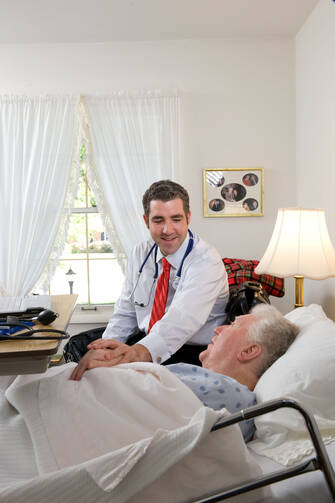Final Payments
So-called “death panels” are in the news again. The phrase, coined by Sarah Palin’s advisers in 2009 to attack the Obama administration’s Affordable Care Act, implied—incorrectly—that a commission of bureaucrats would judge at what point the elderly sick would lose financial support. The government, opponents of the law alleged, would cut off failing seniors to save money. Today, with such concerns over the A.C.A. subsiding, Medicare is considering a request from the American Medical Association to reimburse doctors for end-of-life counseling sessions.
If Medicare follows the recommendation, these “advance care planning” discussions could begin as early as next year. In the meantime, The New York Times (8/30) reports private insurers and various states are “bypassing the political process” to incentivize these important conversations. Blue Cross Blue Shield in Michigan and New York, for example, pay doctors from $35 to $150 for time spent discussing treatment options and completing the required forms. The Times describes a hospital doctor counseling patients in free 40-minute to hour-long conversations; he said he would “do one of these a day” if he were reimbursed. Without payment, doctors say they rush these meetings to squeeze in more billable patients.
Of course doctors must be paid, and everyone has experienced the overcrowded doctor’s office where the patient, having waited over an hour, gets a quick 15 minutes of the physician’s time. But should not something this important be an ongoing part of the compensated relationship rather than a one-time, monetized session stuck on the bill? According to the Journal of Oncology (July 2008), physicians should discuss issues of medical futility and palliative care early on and throughout their time with a patient and family members to the very end.
An Act of Solidarity
Recent news reports have shed a troubling light on the growing black market for kidneys. Patients in Israel and other countries are willing to pay hundreds of thousands of dollars to organ dealers rather than risk waiting for a kidney that may never become available from the legal donor network. The shortage of kidneys has grown so acute that the argument for legalizing their sale is steadily gaining traction.
The sale of human organs on the open market is a bad idea for many reasons. The human body, in any form, should never be for sale. Government policies, like expanded medical leave for live kidney donors, can help to address the kidney shortage, but they alone are not sufficient. Unless more people consider kidney donation as a truly life-giving option, the problem will continue.
Encouraging more people to donate their organs after death is one important step. So is highlighting the church’s positive stance on the issue. Pope Benedict XVI called organ donation an “act of love” in a 2008 speech, adding the important caveat that any transplant must be done with “informed consent” of the donor. The church teaches that organ donation is a “noble and meritorious act and is to be encouraged as an expression of generous solidarity.”
Unfortunately, this part of church teaching is not well known. A greater education campaign is called for, perhaps in conjunction with Jewish and other Christian groups who also vigorously support organ donation. Since objections to organ donation are often based on misunderstandings of religious teachings, religious groups have a special duty to correct this misperception.
Ordinary Time
The song says the best things in life are free. Now science may back that claim. A recent study published in The Journal of Consumer Research found that for older people small, quotidian events can provide as much happiness as extraordinary experiences. This is not to say that the long-planned trip to Paris or that once-in-a-lifetime skydiving adventure will not prove enjoyable. These types of rare or monumental experiences have been shown to provide happiness for young and old alike—and experiences, in general, have been proven to provide more happiness than things. But researchers found that the small, routine events—a trip to the grocery store, a morning cup of coffee, time spent reading a good book—take on greater significance as we age and, for older Americans, provide a satisfaction equal to that of the rare events. While younger people may search out extraordinary events in an effort to define themselves, older people, often more assured in their sense of self, take comfort in the small things that define their days and the lives they have built.
In a still-turbulent economy, this research provides a helpful reminder to young and old alike to avoid the temptations of consumerism and to focus on events and experiences that help us become our truest selves in the eyes of God: “Tell them to do good, to be rich in good works, to be generous, ready to share, thus accumulating as treasure a good foundation for the future, so as to win the life that is true life” (1 Tim 6:18-19).








